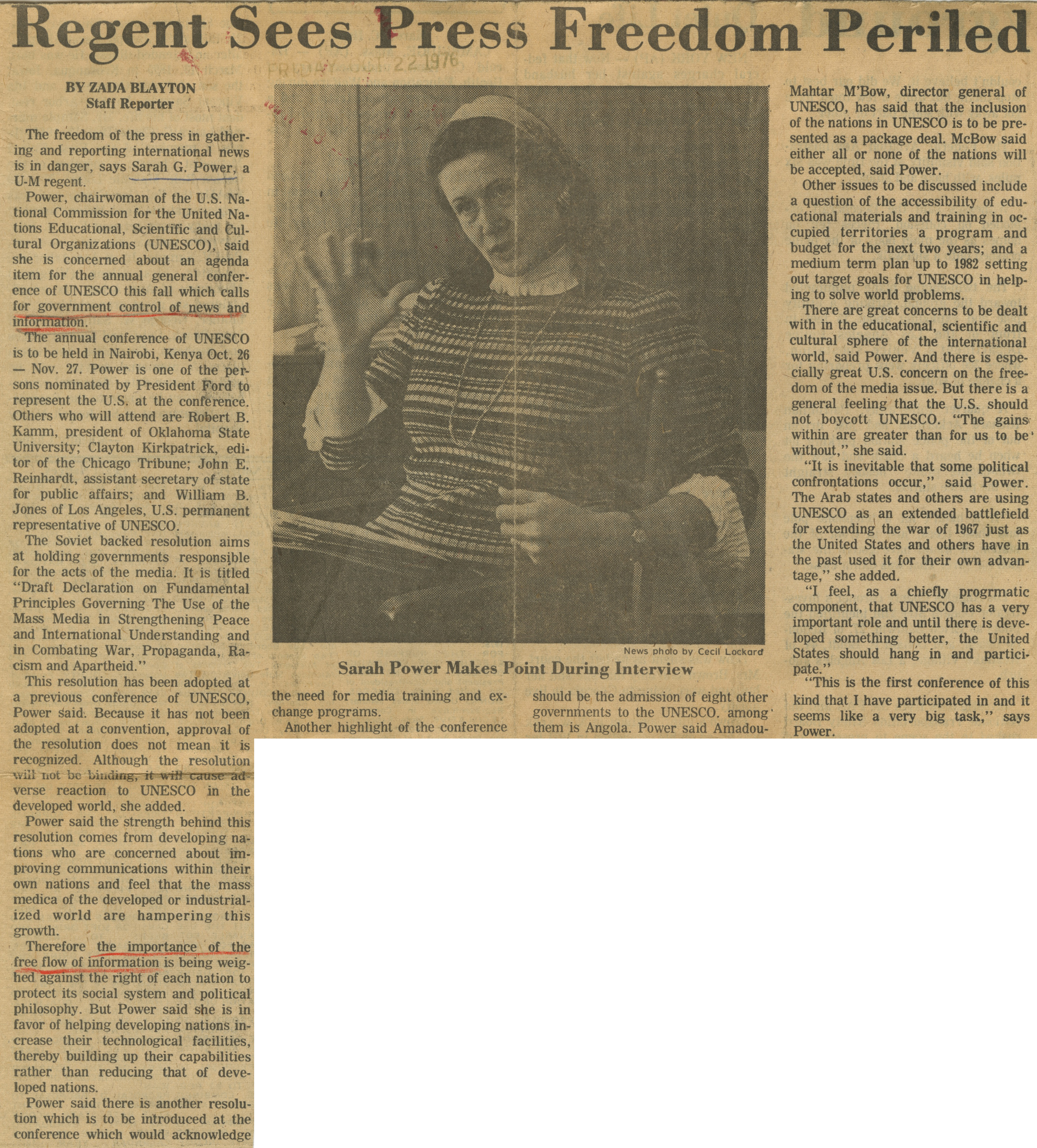Regent Sees Press Freedom Periled

Regent Sees Press Freedom Periled<br><br>BY ZADA BLAYTON Staff Reporter<br><br>The freedom of the press in gathering and reporting international news is in danger, says Sarah G. Power, a U-M regent. -------------------<br><br>Power, chairwoman of the U.S. National Commission for the United Nations Educational, Scientific and Cultural Organizations (UNESCO), said she is concerned about an agenda item for the annual general conference of UNESCO this fall which calls for government control of qews apd<br><br>inwmanmr<br><br>The annual conference of UNESCO is to be held in Nairobi, Kenya Oct. 26 — Nov. 27. Power is one of the persons nominated by President Ford to represent the U.S. at the conference. Others who will attend are Robert B. Kamm, president of Oklahoma State University; Clayton Kirkpatrick, editor of the Chicago Tribune; John E. Reinhardt, assistant secretary of state for public affairs; and William B. Jones of Los Angeles, U.S. permanent representative of UNESCO.<br><br>The Soviet backed resolution aims at holding governments responsible for the acts of the media. It is titled “Draft Declaration on Fundamental Principles Governing The Use of the Mass Media in Strengthening Peace and International Understanding and in Combating War, Propaganda, Racism and Apartheid.”<br><br>This resolution has been adopted at a previous conference of UNESCO, Power Said. Because it has not been adopted at a convention, approval of the resolution does not mean it is recognized. Although the resolution will not be binding, -it-wifi cause-atr verse reaction to UNESCO in the developed world, she added.<br><br>Power said the strength behind this resolution comes from developing nations who are concerned about improving communications within their own nations and feel that the mass medica of the developed or industrialized world are hampering this growth.<br><br>Therefore the importance of _ the free flow of information is being weig-hed agaTnsrth'e right' of each nation to protect its social system and political philosophy. But Power said she is in favor of helping developing nations increase their technological facilities, thereby building up their capabilities rather than reducing that of developed nations.<br><br>Power said there is another resolution which is to be introduced at the conference which would acknowledge<br><br>Sarah Power Makes Point During Interview<br><br>the need for media training and ex- should be the admission of eight other change programs. governments to the UNESCO, among ’<br><br>Another highlight of the conference them is Angola. Power said Amadou-<br><br>Mahtar M’Bow, director general of UNESCO, has said that the inclusion of the nations in UNESCO is to be presented as a package deal. McBow said either all or none of the nations will be accepted, said Power.<br><br>Other issues to be discussed include a question of the accessibility of educational materials and training in occupied territories a program and budget for the next two years; and a medium term plan up to 1982 setting out target goals for UNESCO in helping to solve world problems.<br><br>There are great concerns to be dealt with in the educational, scientific and cultural sphere of the international world, said Power. And there is especially great U.S. concern on the freedom of the media issue. But there is a general feeling that the U.S. should not boycott UNESCO. “The gains within are greater than for us to be‘ without,” she said.<br><br>“It is inevitable that some political confrontations occur,” said Power. The Arab states and others are using UNESCO as an extended battlefield for extending the war of 1967 just as the United States and others have in the past used it for their own advantage,” she added.<br><br>“I feel, as a chiefly progrmatic component, that UNESCO has a very important role and until there is developed something better, the United States should hang in and participate.”<br><br>“This is the first conference of this kind that I have participated in and it